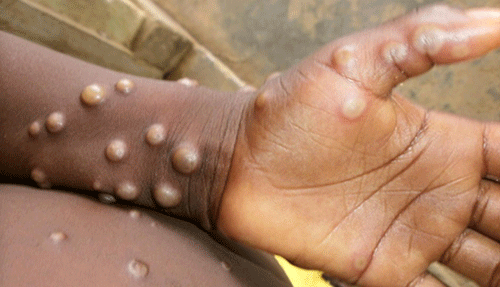The Africa Centres for Disease Control and Prevention has welcomed the declaration by the director-general of the World Health Organisation that the multi-country monkeypox outbreak to be a global public health emergency of international concern.
This following the reporting of over 16 500 cases and 75 deaths from 75 countries globally this year. Of these countries, 11 are Africa Union (AU) member states accounting for approximately 12% of all reported cases with the highest case fatality rate (CFR) globally.
Since the beginning of 2022, 2 031 cases (250 confirmed; 1,781 suspected) and 75 deaths (CFR: 3.7%) of monkeypox have been reported in Africa from nine endemic and two non-endemic AU member states.
However, since the start of the Covid-19 pandemic, over 12 457 cases of MPX have been reported in Africa with at least 365 deaths (CFR 2.9%) as follows: for year 2020 – 7 376 MPX cases and 203 deaths (CFR 2.8%); in 2021 – 3 050 MPX cases with 87 deaths (CFR 2.9%); and in 2022 – 2 031 MPX cases with 75 deaths (CFR 3.1%). For the last three years (2020-2022), the MPX outbreak in Africa continued to grow from one country to another with little international attention. To date, the critical tools required in outbreak preparedness and response including diagnostics, therapeutics, and vaccines, have not yet been made readily available to AU member states.
The first human case of Monkeypox was identified in Democratic Republic of Congo in 1970. Since then, it has been reported as endemic in at least 10 African countries in west and central Africa regions. Although MPX is an endemic disease in Africa, the continent has no vaccines, while access to test kits is very limited. The inequity and delayed access to Covid-19 tools in Africa should not be repeated with MPX, which has been a public health emergency since 2020.
Africa CDC Response Activities
The Africa CDC Emergency Operations Centre has moved to response mode to support preparedness and response efforts of African Union member states, in close collaboration with relevant partners.
The Africa CDC, in collaboration with the Nigerian Centres for Disease Control (NCDC) and the African Society for Laboratory Medicine (ASLM), trained 20 AU MS on MPX diagnostics.
Africa CDC has also continued to distribute test kits to AU member states to support surveillance and detection needs in both endemic and non-endemic countries. Additional rounds of laboratory diagnosis trainings are planned.
The Africa CDC continues to coordinate sequencing support to AU MS as a monitoring tool for any variants of MPX.
The Africa CDC has also engaged with ministries of health of the highly affected member states to provide support to areas of high need.
Africa CDC is communicating with global partners to secure adequate access to test kits and vaccines by AU member states.
The public is advised to:
Seek medical attention if you experience any monkeypox-like symptoms (develop rash with or without prior symptoms of fever, swollen lymph nodes, body aches, and weakness), especially if you have been in contact with a positive case.
Practice effective hand hygiene by washing hands with soap and water or using an alcohol-based hand sanitizer, especially after contact with any infected animals or humans.
Avoid contact with animals that could harbour the virus, including animals that are sick or found dead in areas where monkeypox occurs.
Avoid contact with any potentially contaminated materials, such as clothes and bedding, with which anyone with monkeypox may have been in contact with.
If deemed a close contact of a monkeypox case, individuals should self-monitor for the development of symptoms up to 21 days from the last exposure to a case,
If you are infected with monkeypox, adhere to recommended isolation protocols prescribed by your medical provider to minimise transmission to others, including pets and other animals that may be susceptible to monkeypox infection.


